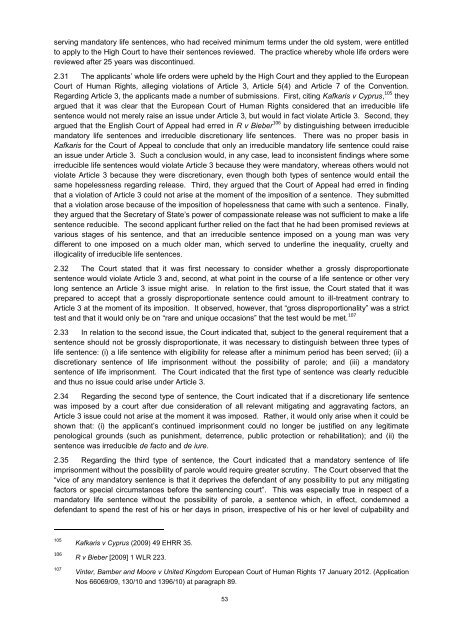Report on Mandatory Sentences - Law Reform Commission
Report on Mandatory Sentences - Law Reform Commission
Report on Mandatory Sentences - Law Reform Commission
Create successful ePaper yourself
Turn your PDF publications into a flip-book with our unique Google optimized e-Paper software.
serving mandatory life sentences, who had received minimum terms under the old system, were entitled<br />
to apply to the High Court to have their sentences reviewed. The practice whereby whole life orders were<br />
reviewed after 25 years was disc<strong>on</strong>tinued.<br />
2.31 The applicants’ whole life orders were upheld by the High Court and they applied to the European<br />
Court of Human Rights, alleging violati<strong>on</strong>s of Article 3, Article 5(4) and Article 7 of the C<strong>on</strong>venti<strong>on</strong>.<br />
Regarding Article 3, the applicants made a number of submissi<strong>on</strong>s. First, citing Kafkaris v Cyprus, 105 they<br />
argued that it was clear that the European Court of Human Rights c<strong>on</strong>sidered that an irreducible life<br />
sentence would not merely raise an issue under Article 3, but would in fact violate Article 3. Sec<strong>on</strong>d, they<br />
argued that the English Court of Appeal had erred in R v Bieber 106 by distinguishing between irreducible<br />
mandatory life sentences and irreducible discreti<strong>on</strong>ary life sentences. There was no proper basis in<br />
Kafkaris for the Court of Appeal to c<strong>on</strong>clude that <strong>on</strong>ly an irreducible mandatory life sentence could raise<br />
an issue under Article 3. Such a c<strong>on</strong>clusi<strong>on</strong> would, in any case, lead to inc<strong>on</strong>sistent findings where some<br />
irreducible life sentences would violate Article 3 because they were mandatory, whereas others would not<br />
violate Article 3 because they were discreti<strong>on</strong>ary, even though both types of sentence would entail the<br />
same hopelessness regarding release. Third, they argued that the Court of Appeal had erred in finding<br />
that a violati<strong>on</strong> of Article 3 could not arise at the moment of the impositi<strong>on</strong> of a sentence. They submitted<br />
that a violati<strong>on</strong> arose because of the impositi<strong>on</strong> of hopelessness that came with such a sentence. Finally,<br />
they argued that the Secretary of State’s power of compassi<strong>on</strong>ate release was not sufficient to make a life<br />
sentence reducible. The sec<strong>on</strong>d applicant further relied <strong>on</strong> the fact that he had been promised reviews at<br />
various stages of his sentence, and that an irreducible sentence imposed <strong>on</strong> a young man was very<br />
different to <strong>on</strong>e imposed <strong>on</strong> a much older man, which served to underline the inequality, cruelty and<br />
illogicality of irreducible life sentences.<br />
2.32 The Court stated that it was first necessary to c<strong>on</strong>sider whether a grossly disproporti<strong>on</strong>ate<br />
sentence would violate Article 3 and, sec<strong>on</strong>d, at what point in the course of a life sentence or other very<br />
l<strong>on</strong>g sentence an Article 3 issue might arise. In relati<strong>on</strong> to the first issue, the Court stated that it was<br />
prepared to accept that a grossly disproporti<strong>on</strong>ate sentence could amount to ill-treatment c<strong>on</strong>trary to<br />
Article 3 at the moment of its impositi<strong>on</strong>. It observed, however, that “gross disproporti<strong>on</strong>ality” was a strict<br />
test and that it would <strong>on</strong>ly be <strong>on</strong> “rare and unique occasi<strong>on</strong>s” that the test would be met. 107<br />
2.33 In relati<strong>on</strong> to the sec<strong>on</strong>d issue, the Court indicated that, subject to the general requirement that a<br />
sentence should not be grossly disproporti<strong>on</strong>ate, it was necessary to distinguish between three types of<br />
life sentence: (i) a life sentence with eligibility for release after a minimum period has been served; (ii) a<br />
discreti<strong>on</strong>ary sentence of life impris<strong>on</strong>ment without the possibility of parole; and (iii) a mandatory<br />
sentence of life impris<strong>on</strong>ment. The Court indicated that the first type of sentence was clearly reducible<br />
and thus no issue could arise under Article 3.<br />
2.34 Regarding the sec<strong>on</strong>d type of sentence, the Court indicated that if a discreti<strong>on</strong>ary life sentence<br />
was imposed by a court after due c<strong>on</strong>siderati<strong>on</strong> of all relevant mitigating and aggravating factors, an<br />
Article 3 issue could not arise at the moment it was imposed. Rather, it would <strong>on</strong>ly arise when it could be<br />
shown that: (i) the applicant’s c<strong>on</strong>tinued impris<strong>on</strong>ment could no l<strong>on</strong>ger be justified <strong>on</strong> any legitimate<br />
penological grounds (such as punishment, deterrence, public protecti<strong>on</strong> or rehabilitati<strong>on</strong>); and (ii) the<br />
sentence was irreducible de facto and de iure.<br />
2.35 Regarding the third type of sentence, the Court indicated that a mandatory sentence of life<br />
impris<strong>on</strong>ment without the possibility of parole would require greater scrutiny. The Court observed that the<br />
“vice of any mandatory sentence is that it deprives the defendant of any possibility to put any mitigating<br />
factors or special circumstances before the sentencing court”. This was especially true in respect of a<br />
mandatory life sentence without the possibility of parole, a sentence which, in effect, c<strong>on</strong>demned a<br />
defendant to spend the rest of his or her days in pris<strong>on</strong>, irrespective of his or her level of culpability and<br />
105<br />
106<br />
107<br />
Kafkaris v Cyprus (2009) 49 EHRR 35.<br />
R v Bieber [2009] 1 WLR 223.<br />
Vinter, Bamber and Moore v United Kingdom European Court of Human Rights 17 January 2012. (Applicati<strong>on</strong><br />
Nos 66069/09, 130/10 and 1396/10) at paragraph 89.<br />
53
















